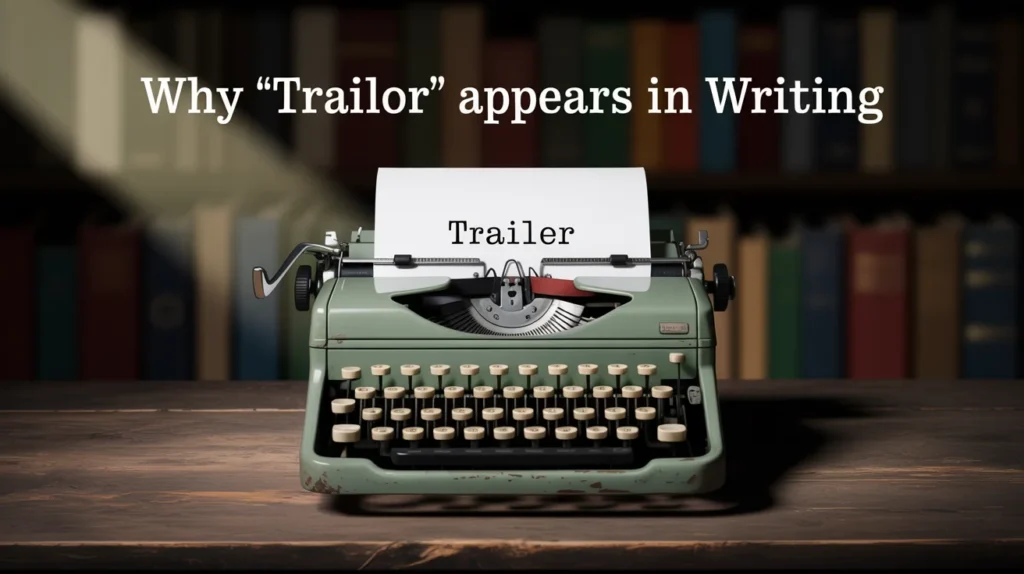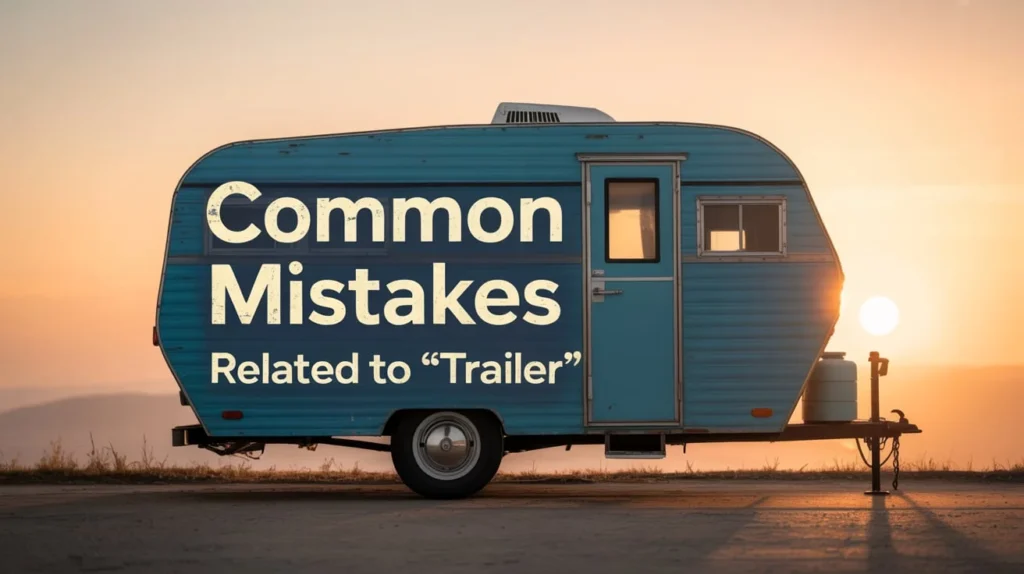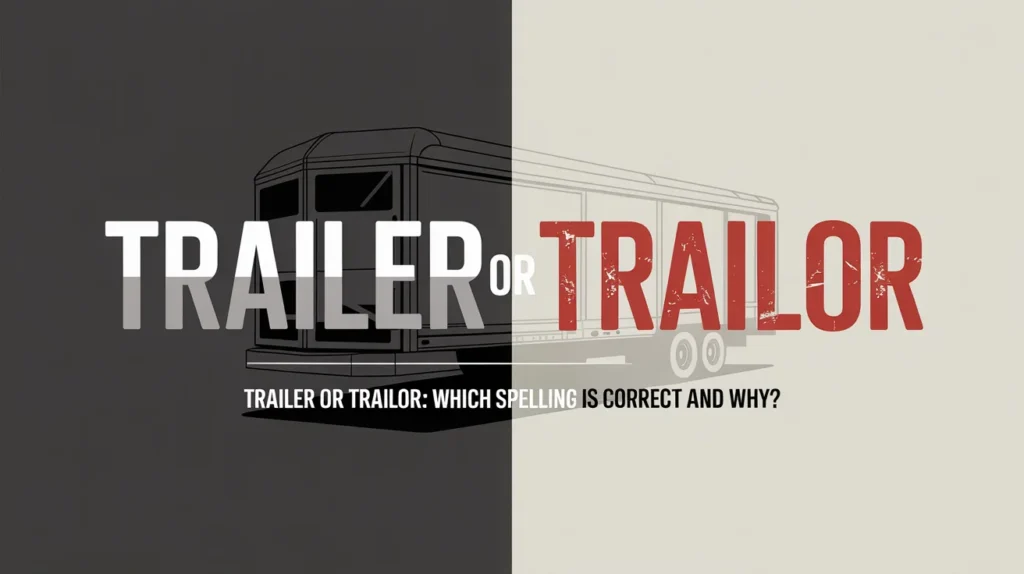If you’ve ever typed “trailor” into Google and wondered whether it looks right, you’re not alone. This spelling mistake shows up everywhere—from online ads to social media posts—leaving many people unsure about which version is correct. The confusion usually comes from how the word sounds when spoken, since both “trailer” or “trailor” roll off the tongue almost the same way. But in written English, only one of these spellings is recognized as correct.
Spelling matters more than most people realize. Using the wrong form in a résumé, business report, or academic essay can quickly damage credibility. For companies, an incorrect spelling on a website or product label can reduce trust and even hurt search rankings. This is why it’s worth taking a few minutes to understand why “trailer” is the right spelling, and why “trailor” never makes the cut.
In this article, you’ll learn the exact difference between these two spellings, explore why the mistake is so common, and see how “trailer” developed its meanings over time. We’ll look at how it’s used in different industries, from trucking to film, and even examine Google search data to see why people continue to type “trailor.” Most importantly, you’ll walk away with simple tips and memory tricks to make sure you never second-guess yourself again.
Let’s break down the facts and settle the debate once and for all.
The Correct Spelling: Trailer
The correct spelling is trailer. No reputable dictionary or grammar guide lists “trailor” as an acceptable variation. Merriam-Webster, Oxford English Dictionary, and Cambridge Dictionary all define trailer as:
- A vehicle designed to be pulled by another, such as a car or truck.
- A short promotional video for a movie, series, or game.
- A portable structure that serves as a living or working space.
Here are a few examples of proper usage:
- “We rented a trailer for our road trip across the country.”
- “The new Marvel movie trailer broke YouTube records within 24 hours.”
- “Construction crews are using a trailer as a temporary office.”
Notice how natural the spelling looks in each sentence. “Trailor” would instantly look wrong, and in professional writing, that kind of error can undermine trust.
Why “Trailor” Appears in Writing

So why do so many people spell it “trailor”? There are a few common reasons:
- Phonetic spelling: The way we pronounce words often influences how we spell them. Since “-er” and “-or” endings sound similar, writers sometimes swap them.
- Typing mistakes: Fast typing leads to common letter swaps, especially between vowels.
- Regional habits: In some communities, incorrect forms become so widespread that they look “normal.”
- Search engine reinforcement: When people search “trailor,” they still find relevant results because Google autocorrects it behind the scenes. This makes the mistake more persistent.
For example, local classifieds might list:
- “Utility Trailor for Sale – Good Condition”
- “Food Trailor Business Start-Up Kit”
These ads are easy to find online, but the spelling remains wrong every time. Businesses that use the incorrect spelling risk appearing less professional to customers.
Etymology and Word Origin of “Trailer”
The word trailer comes from the verb trail, meaning “to follow behind,” combined with the suffix -er, which denotes something or someone performing the action. A trailer literally refers to something that trails.
Historically, the term appeared in the early 20th century to describe vehicles towed behind cars and trucks. Later, Hollywood borrowed the word to describe short film previews shown at the end of movies—yes, at first trailers came after the film. Even though the previews were eventually moved to the beginning, the name stuck.
This dual usage—vehicles and films—explains why “trailer” became such a versatile word in English. But at no point in its history was “trailor” recognized as correct.
Trailer in Different Contexts
The word “trailer” is more flexible than people realize. Here are the main contexts where you’ll encounter it:
Vehicles
- Cargo trailers: used to transport goods.
- Utility trailers: small, open trailers for personal or business use.
- Travel trailers: portable living spaces pulled by vehicles.
Example: “The moving company used three large trailers to deliver the furniture.”
Movies
- Film trailers: promotional videos designed to tease upcoming releases.
- TV trailers: short clips aired on networks or streaming platforms.
Example: “The studio dropped a new trailer for the sequel during the Super Bowl.”
Other Uses
- Mobile homes are often referred to as trailers in American English.
- Temporary offices or classrooms also fall under this term.
Example: “The school added two portable trailers to handle increased enrollment.”
Regional and Cultural Perspectives
Is “trailor” used anywhere as an accepted spelling? The answer is no.
Dictionaries across the board—Oxford, Cambridge, Collins, Merriam-Webster—list trailer as the only correct spelling. Style guides such as the Chicago Manual of Style and Associated Press (AP) also recognize “trailer” exclusively.
In some regions, however, the incorrect form “trailor” appears more frequently in casual writing. For instance:
- Online forums in South Asia and Africa show higher rates of “trailor.”
- Local businesses occasionally advertise “trailor rentals” or “trailor parts.”
Still, these instances reflect informal mistakes, not regional spelling variations. Unlike words such as “color/colour,” there is no official regional split.
Trailer vs. Trailor in Search Trends
To understand how widespread the confusion is, a quick look at Google Trends and keyword data helps.
| Search Term | Global Monthly Searches | Correct/Incorrect |
| trailer | 5M+ | Correct |
| trailor | 50K+ | Incorrect |
Although “trailor” is wrong, tens of thousands of people search it every month. Why?
- Autocorrect and search engines: Google usually serves results for “trailer” even if “trailor” was typed.
- Businesses trying to capture traffic: Some companies deliberately include “trailor” on their websites to catch those searches.
- Phonetic spelling errors: Users type words as they sound.
This explains why “trailor” lingers online, even though it’s incorrect.
Memory Aids to Avoid Misspelling
If you often second-guess yourself, here are simple memory tricks:
- Break it down: Remember that trailer = trail + -er.
- Visual cue: Imagine something that trails behind. Add -er to make it a noun.
- Mnemonic: “If it follows, it’s a trailer.”
Diagram:
Trail → Trailer
(something that follows behind)
These small memory devices can save you from slipping into the “trailor” trap.
Common Mistakes Related to “Trailer”

Spelling isn’t the only issue. Here are a few mistakes writers and businesses make:
- Incorrect plural: “trailors” instead of trailers.
- Mixing contexts: Using “movie trailor” instead of movie trailer in headlines.
- Professional misuse: Companies printing “trailor park” on signs, damaging their credibility.
Example of a bad sentence:
- “The trailor was parked outside the theater.”
Corrected version:
- “The trailer was parked outside the theater.”
Practical Guidance for Writers and Learners
For anyone writing in English—whether you’re a student, professional, or business owner—the safest choice is always trailer.
- In formal writing (essays, reports, résumés), use “trailer” exclusively.
- For business use, double-check marketing materials to ensure credibility.
- For SEO: consider adding “trailor” as a keyword only in metadata or FAQs but never as the main spelling. This allows you to capture search traffic while maintaining professionalism.
- For ESL learners: practice with sentence examples until “trailer” feels natural.
Conclusion
The debate between trailer or trailor isn’t really a debate at all. Only one spelling—trailer—has ever been correct. The word comes directly from “trail” plus the suffix “-er,” and it’s recognized across dictionaries, style guides, and professional usage.
The incorrect form, “trailor,” persists online because of phonetic spelling habits, regional errors, and search engine reinforcement. But that doesn’t make it right. Whether you’re talking about a movie preview, a truck attachment, or a mobile home, the correct word is always trailer.
So next time you write the word, remember:
- Trailer = correct.
- Trailor = mistake.
Getting it right helps you sound professional, trustworthy, and accurate—qualities that matter in both personal and professional communication.

Emma Brooke is a passionate English educator, writer, and language enthusiast with over a decade of experience helping learners master the nuances of the English language. At SynoEnglish, she blends practical grammar advice with real-world communication tips to make English easier, clearer, and more enjoyable for readers of all levels.



